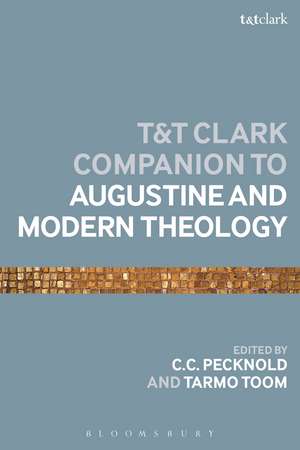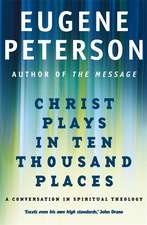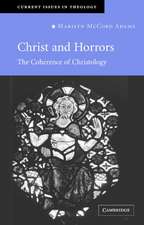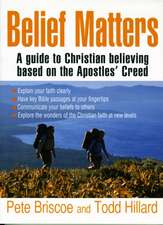The T&T Clark Companion to Augustine and Modern Theology: Bloomsbury Companions
Editat de C.C. Pecknold, Dr. Tarmo Toomen Limba Engleză Paperback – 20 apr 2016
| Toate formatele și edițiile | Preț | Express |
|---|---|---|
| Paperback (1) | 198.61 lei 43-57 zile | |
| Bloomsbury Publishing – 20 apr 2016 | 198.61 lei 43-57 zile | |
| Hardback (1) | 823.78 lei 40-51 zile | |
| T & T Clark International – 14 aug 2013 | 823.78 lei 40-51 zile |
Din seria Bloomsbury Companions
- 43%
 Preț: 943.24 lei
Preț: 943.24 lei - 16%
 Preț: 258.54 lei
Preț: 258.54 lei - 21%
 Preț: 256.42 lei
Preț: 256.42 lei - 48%
 Preț: 626.47 lei
Preț: 626.47 lei -
 Preț: 822.27 lei
Preț: 822.27 lei - 17%
 Preț: 256.89 lei
Preț: 256.89 lei - 17%
 Preț: 257.81 lei
Preț: 257.81 lei - 44%
 Preț: 941.35 lei
Preț: 941.35 lei - 41%
 Preț: 226.40 lei
Preț: 226.40 lei -
 Preț: 771.53 lei
Preț: 771.53 lei - 12%
 Preț: 266.68 lei
Preț: 266.68 lei - 44%
 Preț: 940.38 lei
Preț: 940.38 lei - 17%
 Preț: 253.85 lei
Preț: 253.85 lei - 44%
 Preț: 937.45 lei
Preț: 937.45 lei - 45%
 Preț: 141.20 lei
Preț: 141.20 lei - 17%
 Preț: 254.58 lei
Preț: 254.58 lei - 27%
 Preț: 383.62 lei
Preț: 383.62 lei - 44%
 Preț: 938.96 lei
Preț: 938.96 lei - 7%
 Preț: 304.89 lei
Preț: 304.89 lei - 17%
 Preț: 239.59 lei
Preț: 239.59 lei - 12%
 Preț: 257.36 lei
Preț: 257.36 lei - 12%
 Preț: 255.97 lei
Preț: 255.97 lei - 17%
 Preț: 253.67 lei
Preț: 253.67 lei - 12%
 Preț: 264.39 lei
Preț: 264.39 lei - 16%
 Preț: 258.28 lei
Preț: 258.28 lei - 44%
 Preț: 937.06 lei
Preț: 937.06 lei - 41%
 Preț: 225.08 lei
Preț: 225.08 lei - 12%
 Preț: 254.58 lei
Preț: 254.58 lei - 22%
 Preț: 252.76 lei
Preț: 252.76 lei - 17%
 Preț: 255.51 lei
Preț: 255.51 lei - 41%
 Preț: 193.99 lei
Preț: 193.99 lei - 36%
 Preț: 871.22 lei
Preț: 871.22 lei - 44%
 Preț: 938.96 lei
Preț: 938.96 lei - 17%
 Preț: 254.14 lei
Preț: 254.14 lei -
 Preț: 930.14 lei
Preț: 930.14 lei - 11%
 Preț: 267.60 lei
Preț: 267.60 lei - 36%
 Preț: 944.19 lei
Preț: 944.19 lei - 10%
 Preț: 271.74 lei
Preț: 271.74 lei - 26%
 Preț: 1161.10 lei
Preț: 1161.10 lei - 43%
 Preț: 220.26 lei
Preț: 220.26 lei - 12%
 Preț: 263.56 lei
Preț: 263.56 lei - 43%
 Preț: 925.87 lei
Preț: 925.87 lei -
 Preț: 270.06 lei
Preț: 270.06 lei
Preț: 198.61 lei
Preț vechi: 349.57 lei
-43% Nou
Puncte Express: 298
Preț estimativ în valută:
38.02€ • 41.31$ • 31.95£
38.02€ • 41.31$ • 31.95£
Carte tipărită la comandă
Livrare economică 21 aprilie-05 mai
Preluare comenzi: 021 569.72.76
Specificații
ISBN-13: 9780567667922
ISBN-10: 0567667928
Pagini: 304
Dimensiuni: 156 x 234 x 25 mm
Greutate: 0.5 kg
Ediția:NIP
Editura: Bloomsbury Publishing
Colecția T&T Clark
Seria Bloomsbury Companions
Locul publicării:London, United Kingdom
ISBN-10: 0567667928
Pagini: 304
Dimensiuni: 156 x 234 x 25 mm
Greutate: 0.5 kg
Ediția:NIP
Editura: Bloomsbury Publishing
Colecția T&T Clark
Seria Bloomsbury Companions
Locul publicării:London, United Kingdom
Caracteristici
Provides a foundational and innovative companion to the thought of Augustine.
Notă biografică
C.C. Pecknold is Associate Professor at the Catholic University of America, USATarmo Toom is Associate Professor at the Catholic University of America, USA
Cuprins
Editorial Introduction - Chad Pecknold and Tarmo ToomPart I: Doctrines1. Augustine on God - Luigi Gioia2. Augustine on Human Being - Michael Hanby3. Augustine on Christ - Ronnie Rombs4. Augustine on the Church - Michael Root5. Augustine on Scripture - Tarmo Toom6. Augustine on the Last Things - Morwenna LudlowPart II: Theologians 7. Augustine and Aquinas - Frederick Christian Bauerschmidt8. Augustine and Bonaventure - Joshua C. Benson9. Augustine and Luther - Phillip Cary10. Augustine and Calvin - Anthony N. S. Lane11. Augustine and Henri de Lubac - Chad Pecknold and Jacob Wood12. Augustine and John Zizioulas - Will Cohen
Recenzii
Trim and readable ... [This volume] present[s] several poignant, interesting, and teachable essays.
The time is right for this book. The renewed interest in the study of theology and in the thought of the early Church that followed the Second Vatican Council has reached a certain maturity. It is, therefore, a good moment to expand the reach of each discipline by deepening the conversation between them. This Companion to Augustine and Modern Theology claims that it will be "useful in the hands of students seeking to bring the wisdom of Augustine to their own theological labors." (p. 17) It is, I think, more than that. It will also challenge theologians to examine their agreements and differences with Augustine and learn to exploit the tensions they find there in productive ways. It will challenge those who study Augustine to show how the pastoral quality of his thought keeps his theology firmly engaged with the times and situations he faced. The collection of articles found in this book are a good beginning. They deal with central themes and significant historical figures in a way that ought to stimulate both further engagement and more publications.
There are plenty of guides to Augustine's thought; the world doesn't need another. This book is something different: a companion to the reception of that thought, and to its effects on the development of particular Christian doctrines and theologians. There's nothing like it in English, and since the standard of the individual contributions is uniformly high, it is essential reading for anyone interested in what makes the West Augustinian, or in the variety of Augustinianisms there are.
This impressive volume bears the fruits of the Augustine renewal of the past fifteen years. The editors have gathered together major essays of a uniformly high level. With this book, Augustinian theology as a constructive and ecumenical venture moves to the forefront of the theological scene.
What a wonderful volume! Pecknold and Toom have drawn together a collection that opens multiple windows onto one of the most important and complex theologians of the western tradition. The first half of the book provides concise and powerful treatments of key themes in Augustine's thought; the second half entices us along some of the many roads that lead from Augustine to modern Christian thought. Throughout the compelling and continually generative nature of Augustine's thought shines.
One of the most interesting recent developments in contemporary theology is a return to Augustine as theological resource. It is not too strong to say that some of the most creative modern theology is "Augustinian" in some way, predicated on a recovery and re-articulation of fundamental insights, and maybe even more importantly, a fundamental theological style, that characterized Augustine. This new volume provides an indispensable tool for anyone wishing to track this renewal in theology, and also for those wishing, in their own way, to contribute to it. Somewhat unexpectedly but certainly pleasantly, one discovers in reading these essays that in attempting to develop Augustinian thinking in a modern context, one is also learning to see Augustine himself anew. The implication is that, perhaps, the only way to study Augustine in a way that does him justice, is to develop his thinking in dialogue with the big theological questions of one's own time.
Out of the many learned reference works on Augustine, this accessible companion stands out among them because it is both historically informed and theologically generative. In fact, by reading Augustine in conversation with important developments in Christian doctrine and in dialogue with prominent theologians, these essays provide a welcome contribution to Augustine studies and contemporary theology. I highly recommend it for students and scholars alike.
The time is right for this book. The renewed interest in the study of theology and in the thought of the early Church that followed the Second Vatican Council has reached a certain maturity. It is, therefore, a good moment to expand the reach of each discipline by deepening the conversation between them. This Companion to Augustine and Modern Theology claims that it will be "useful in the hands of students seeking to bring the wisdom of Augustine to their own theological labors." (p. 17) It is, I think, more than that. It will also challenge theologians to examine their agreements and differences with Augustine and learn to exploit the tensions they find there in productive ways. It will challenge those who study Augustine to show how the pastoral quality of his thought keeps his theology firmly engaged with the times and situations he faced. The collection of articles found in this book are a good beginning. They deal with central themes and significant historical figures in a way that ought to stimulate both further engagement and more publications.
There are plenty of guides to Augustine's thought; the world doesn't need another. This book is something different: a companion to the reception of that thought, and to its effects on the development of particular Christian doctrines and theologians. There's nothing like it in English, and since the standard of the individual contributions is uniformly high, it is essential reading for anyone interested in what makes the West Augustinian, or in the variety of Augustinianisms there are.
This impressive volume bears the fruits of the Augustine renewal of the past fifteen years. The editors have gathered together major essays of a uniformly high level. With this book, Augustinian theology as a constructive and ecumenical venture moves to the forefront of the theological scene.
What a wonderful volume! Pecknold and Toom have drawn together a collection that opens multiple windows onto one of the most important and complex theologians of the western tradition. The first half of the book provides concise and powerful treatments of key themes in Augustine's thought; the second half entices us along some of the many roads that lead from Augustine to modern Christian thought. Throughout the compelling and continually generative nature of Augustine's thought shines.
One of the most interesting recent developments in contemporary theology is a return to Augustine as theological resource. It is not too strong to say that some of the most creative modern theology is "Augustinian" in some way, predicated on a recovery and re-articulation of fundamental insights, and maybe even more importantly, a fundamental theological style, that characterized Augustine. This new volume provides an indispensable tool for anyone wishing to track this renewal in theology, and also for those wishing, in their own way, to contribute to it. Somewhat unexpectedly but certainly pleasantly, one discovers in reading these essays that in attempting to develop Augustinian thinking in a modern context, one is also learning to see Augustine himself anew. The implication is that, perhaps, the only way to study Augustine in a way that does him justice, is to develop his thinking in dialogue with the big theological questions of one's own time.
Out of the many learned reference works on Augustine, this accessible companion stands out among them because it is both historically informed and theologically generative. In fact, by reading Augustine in conversation with important developments in Christian doctrine and in dialogue with prominent theologians, these essays provide a welcome contribution to Augustine studies and contemporary theology. I highly recommend it for students and scholars alike.










